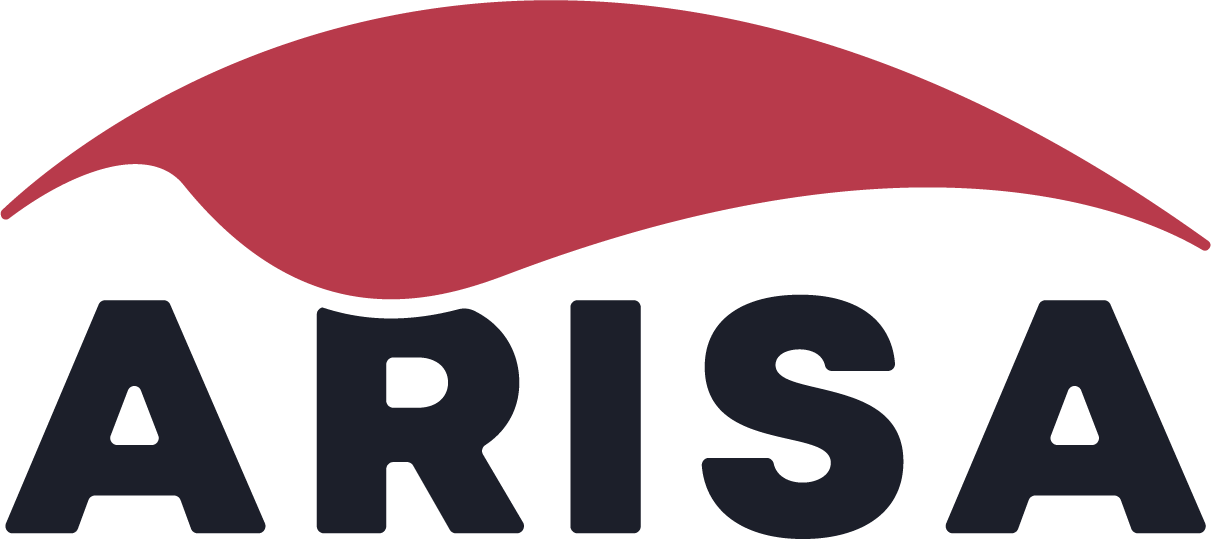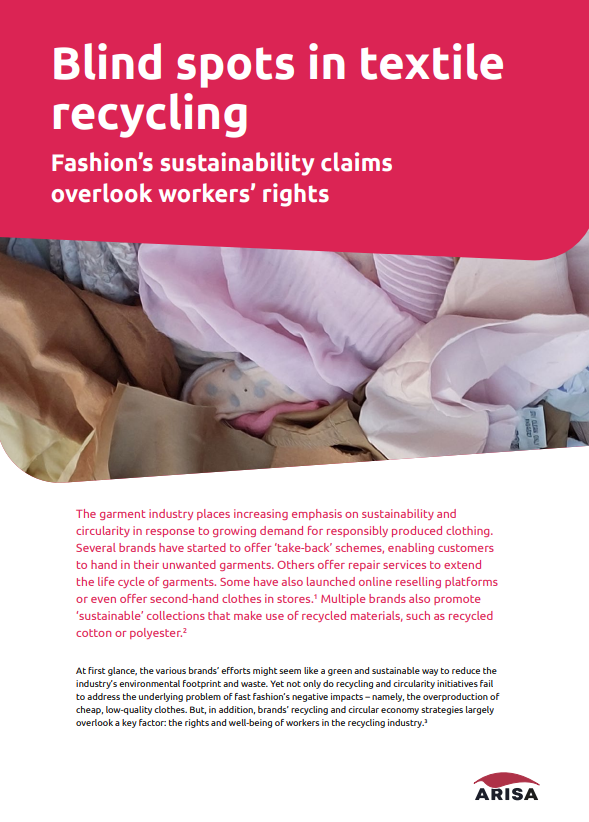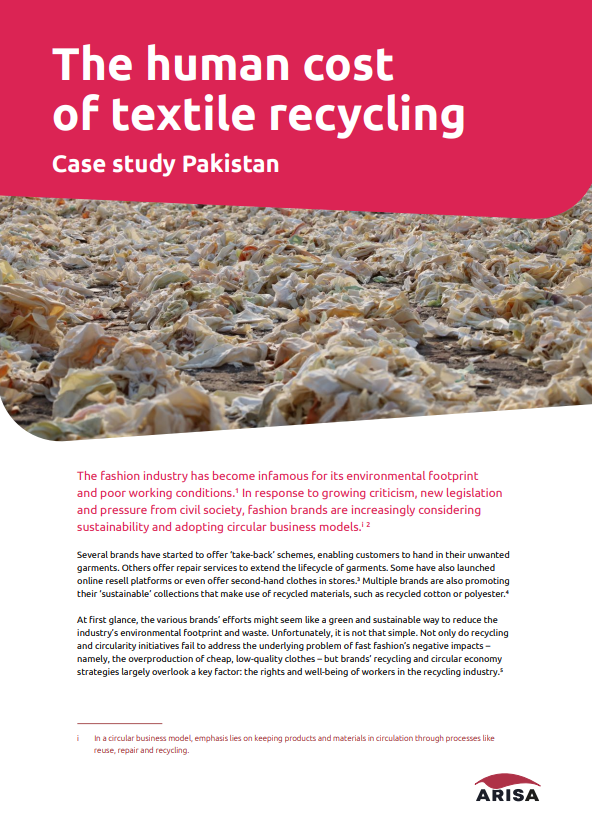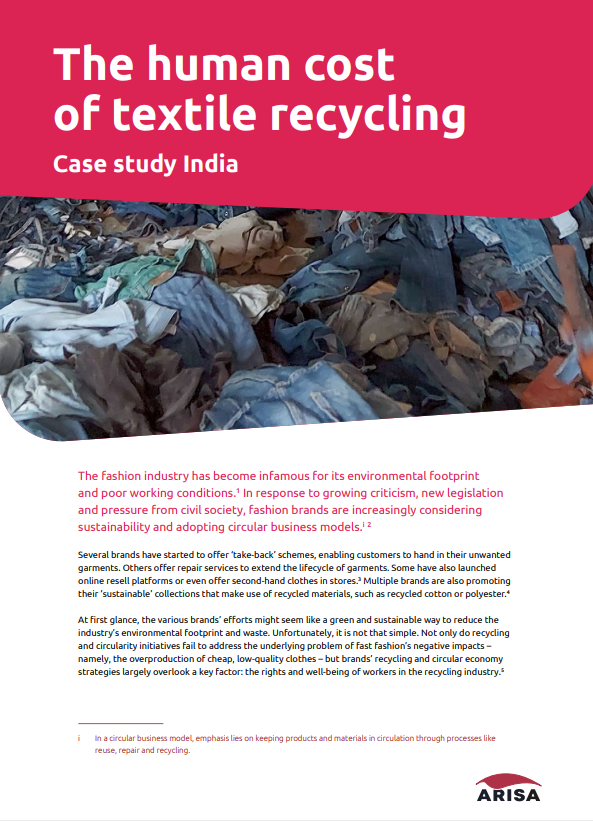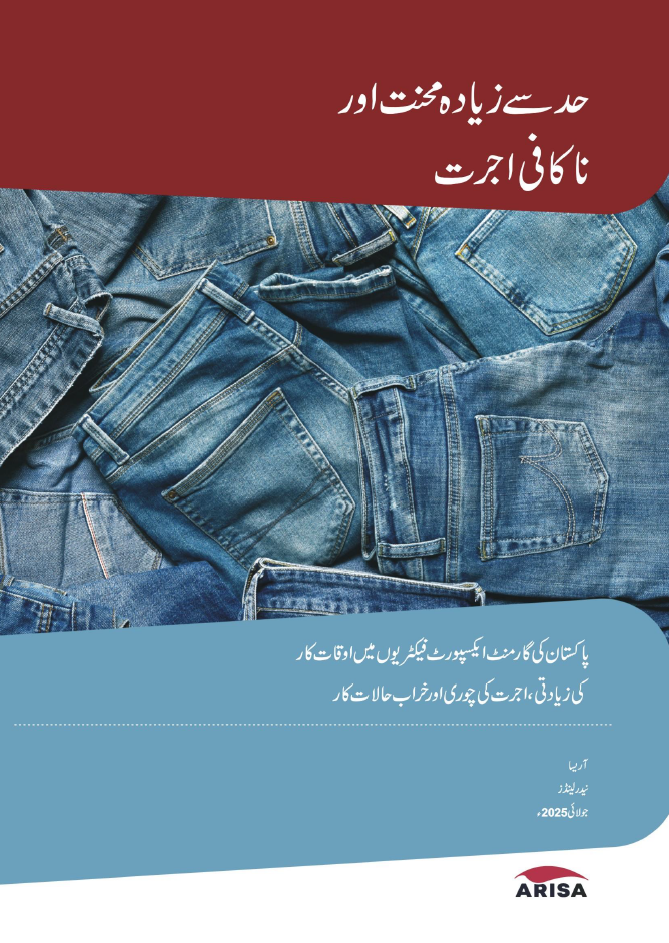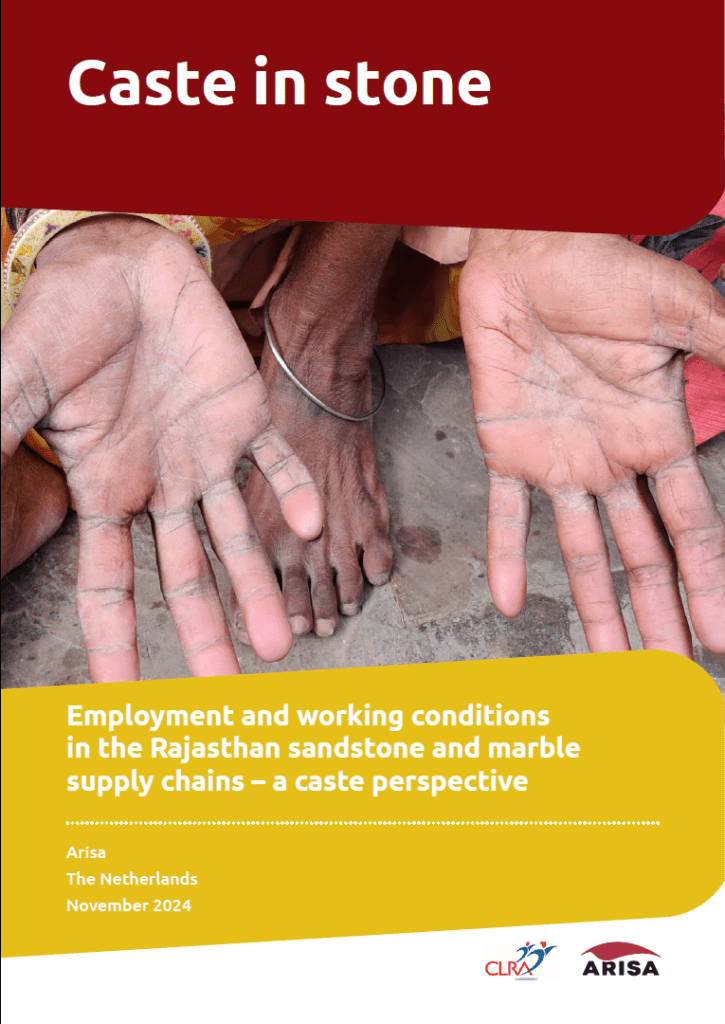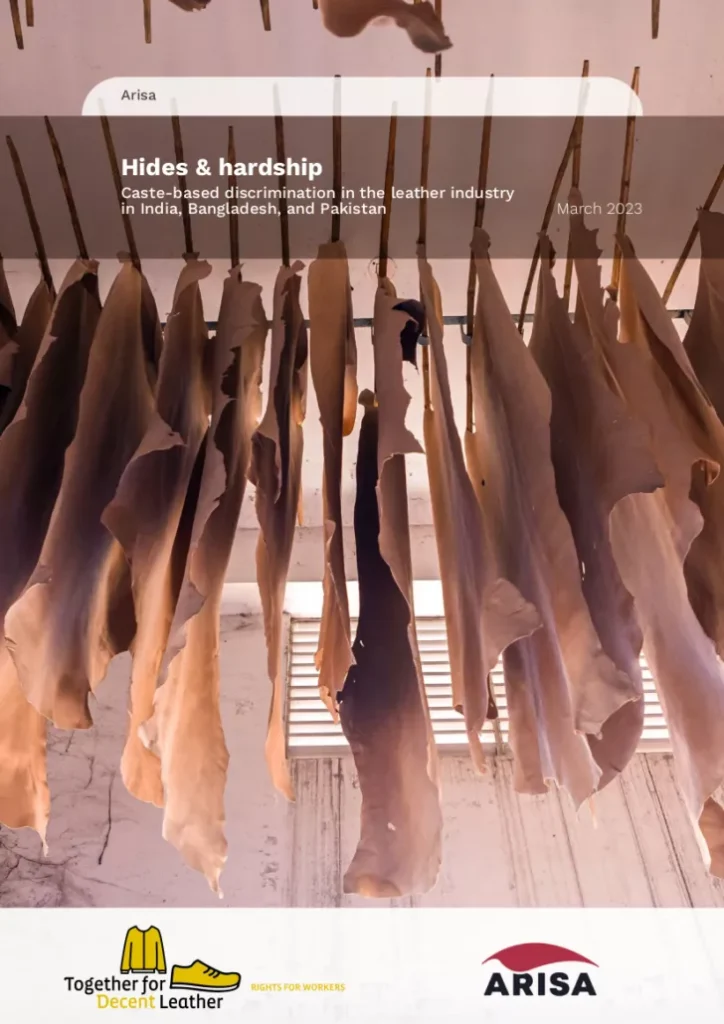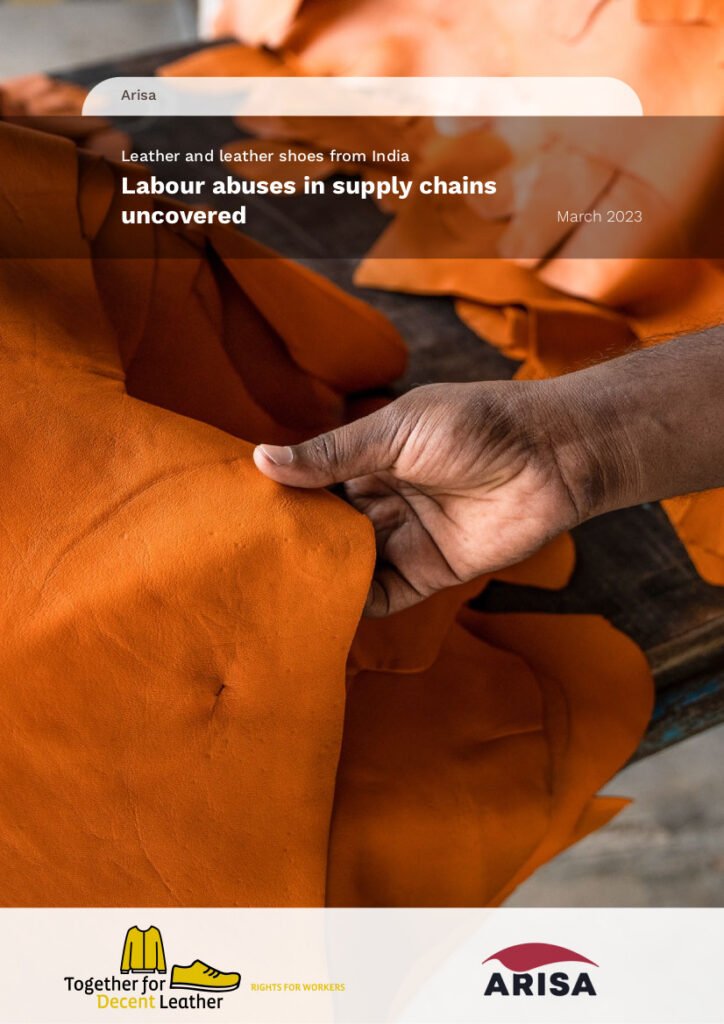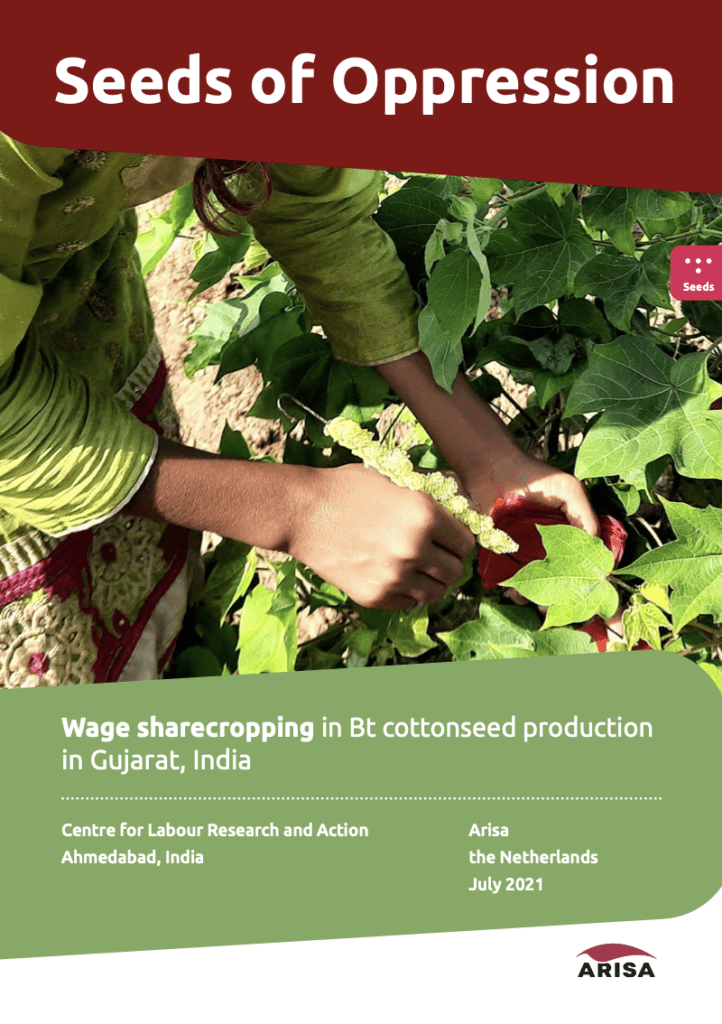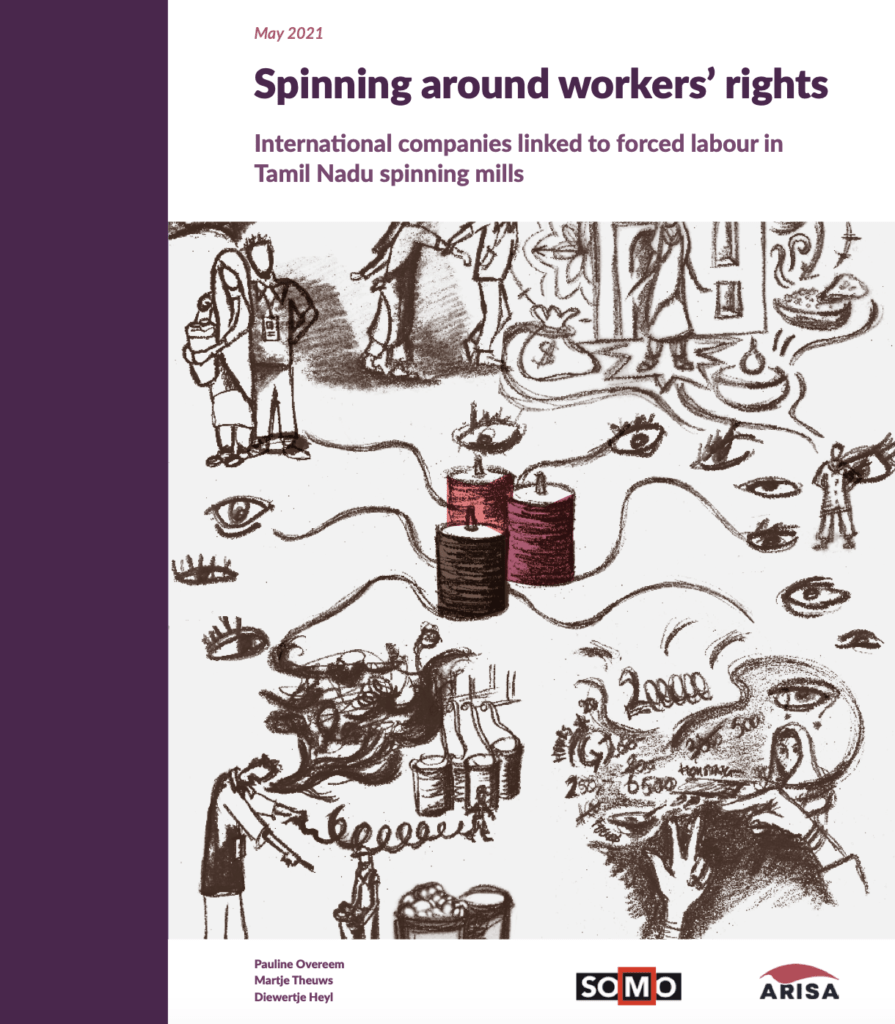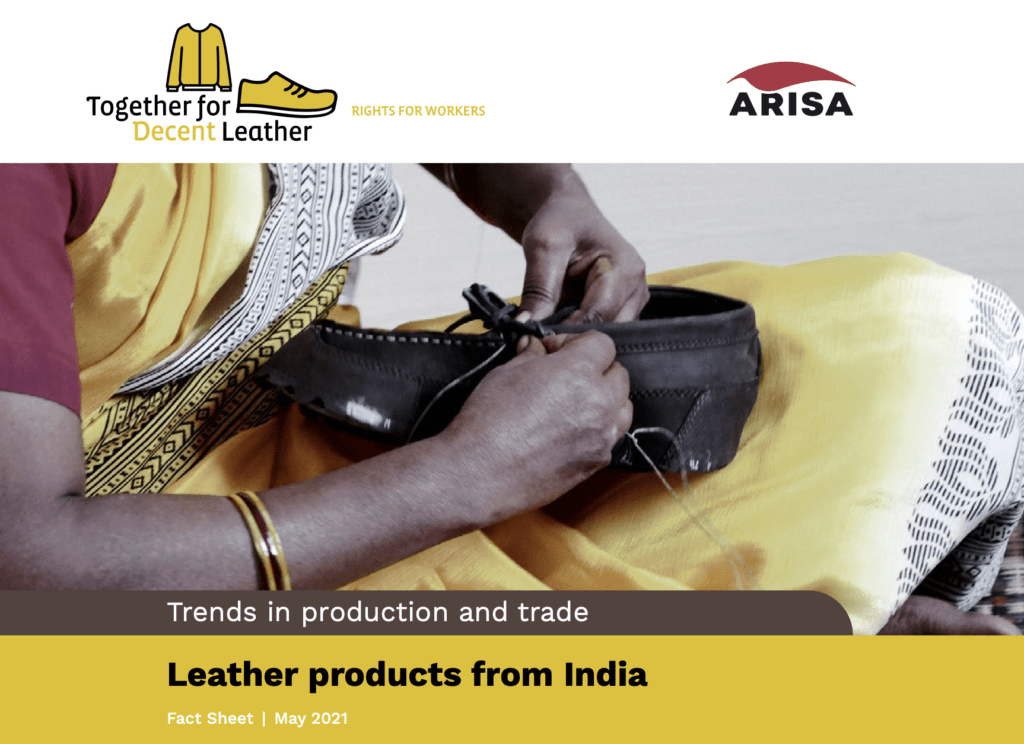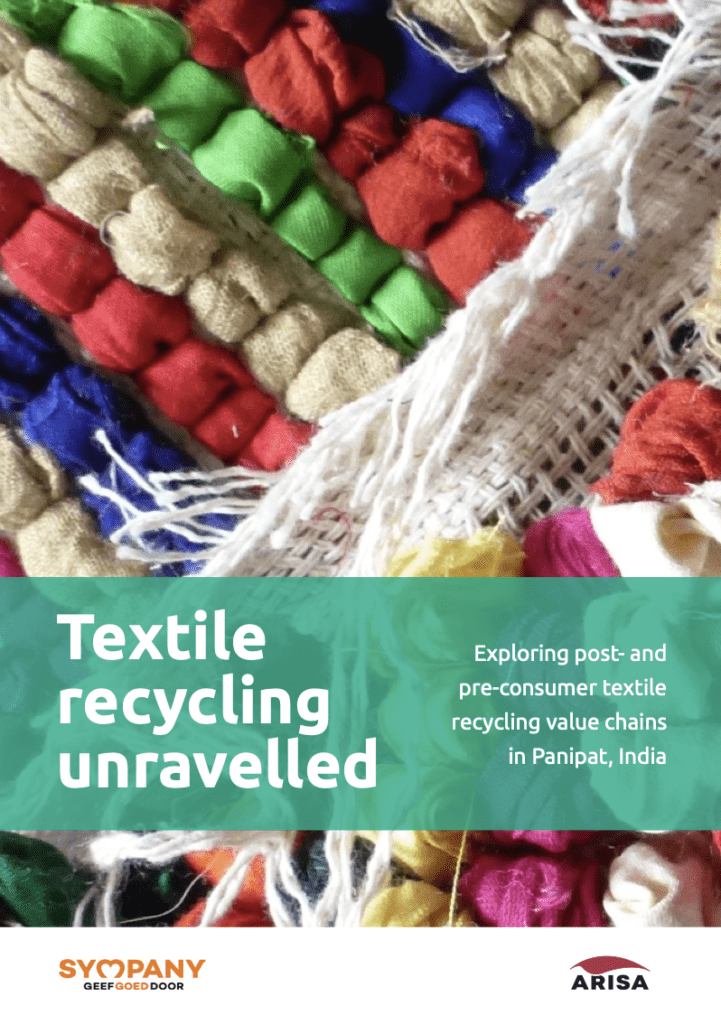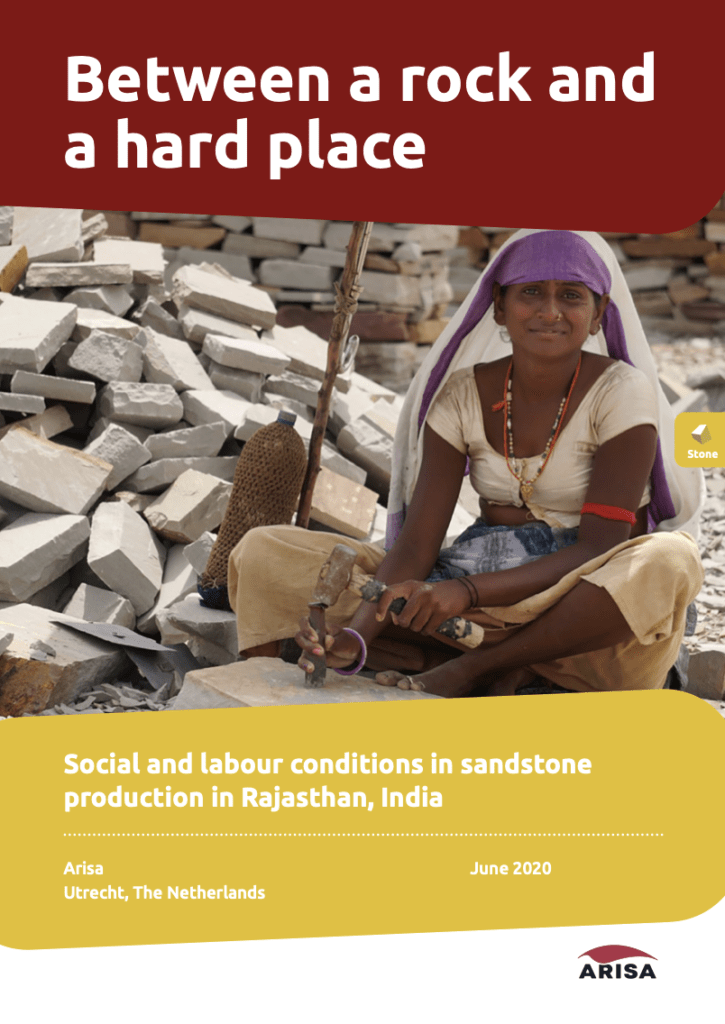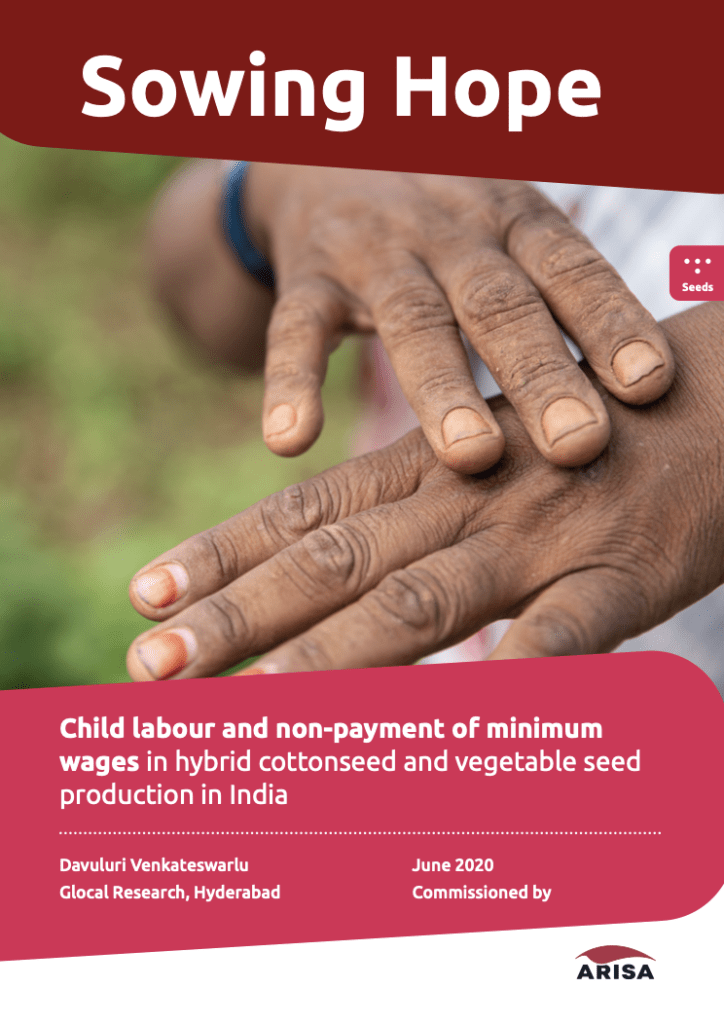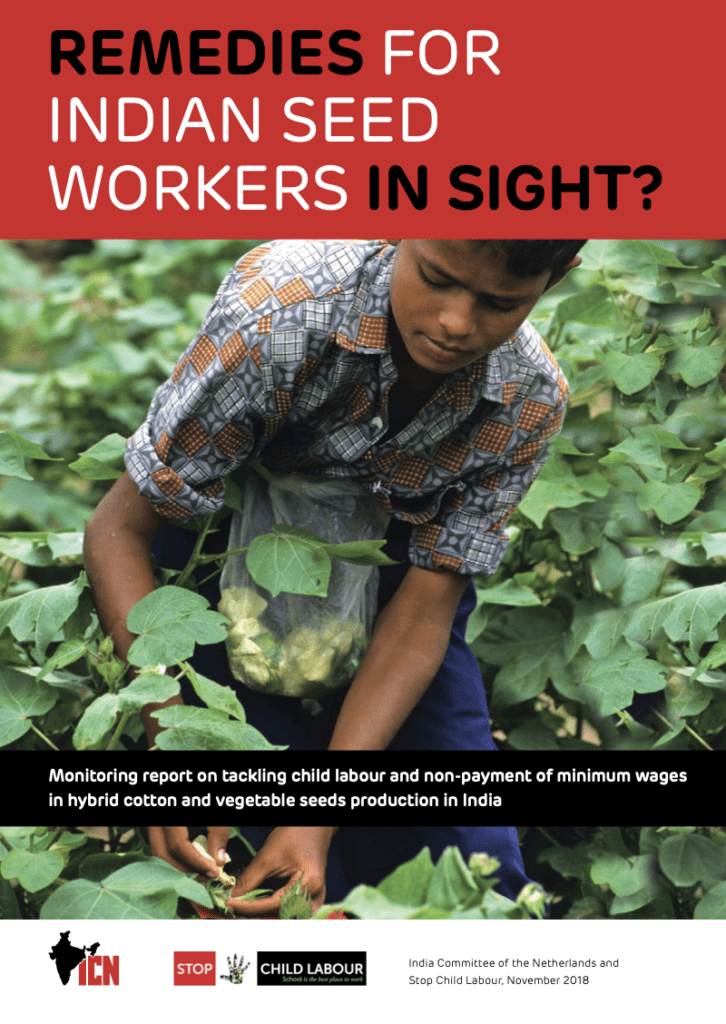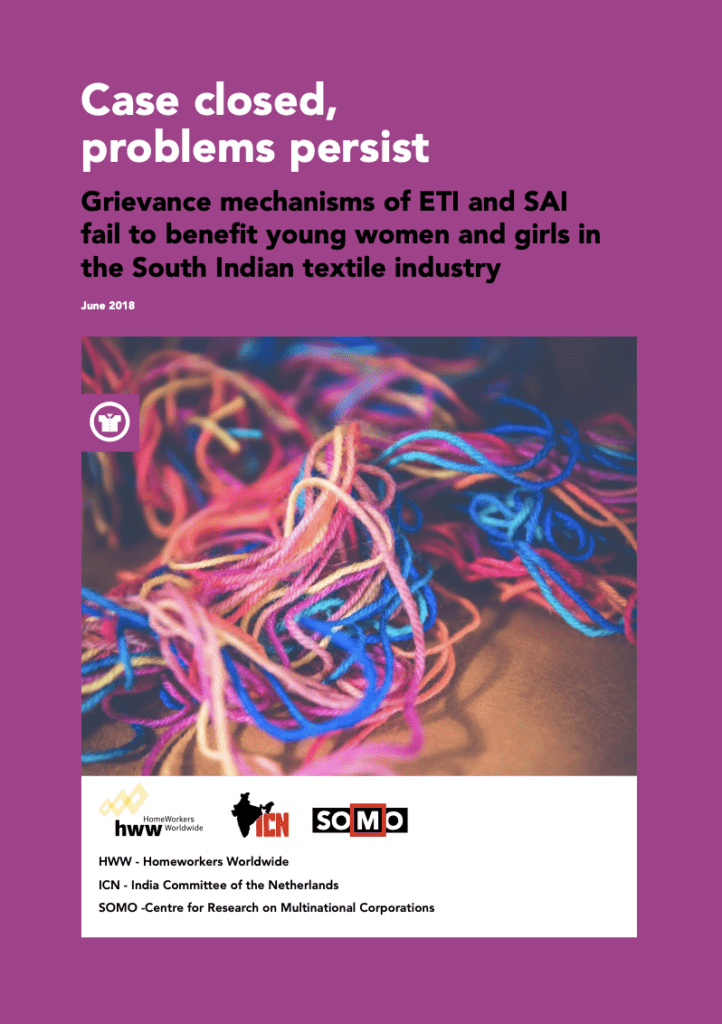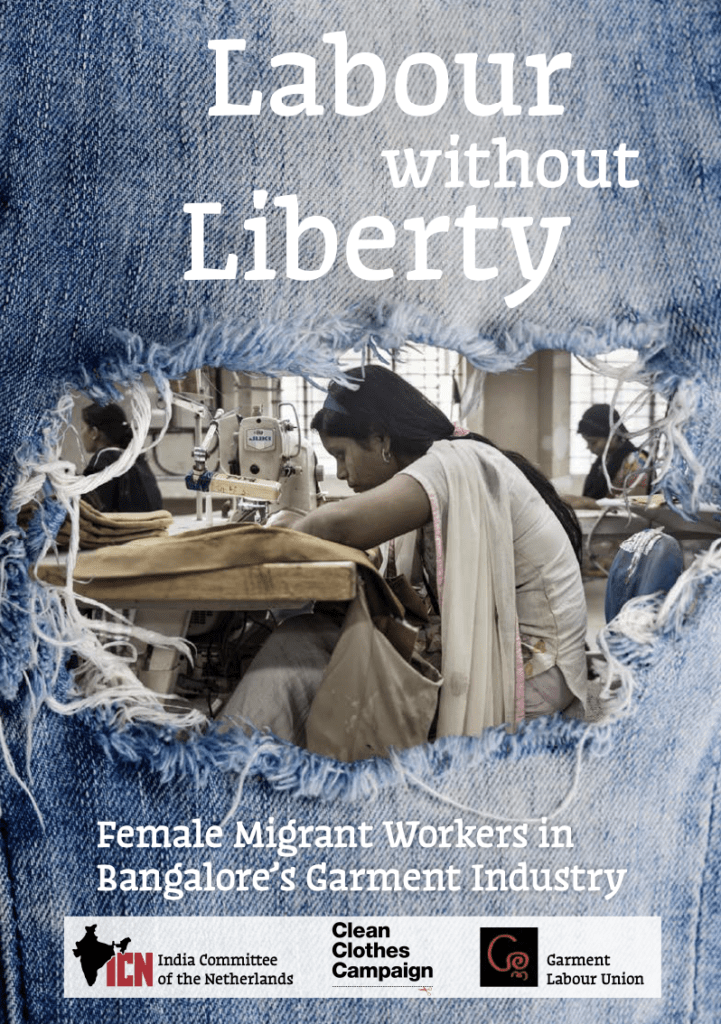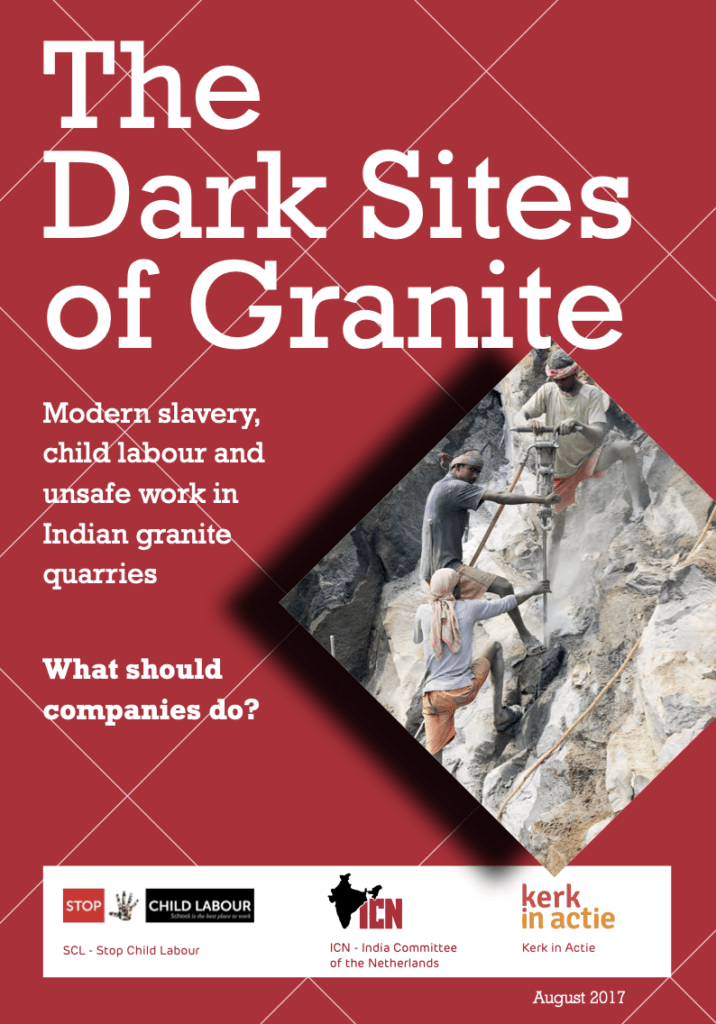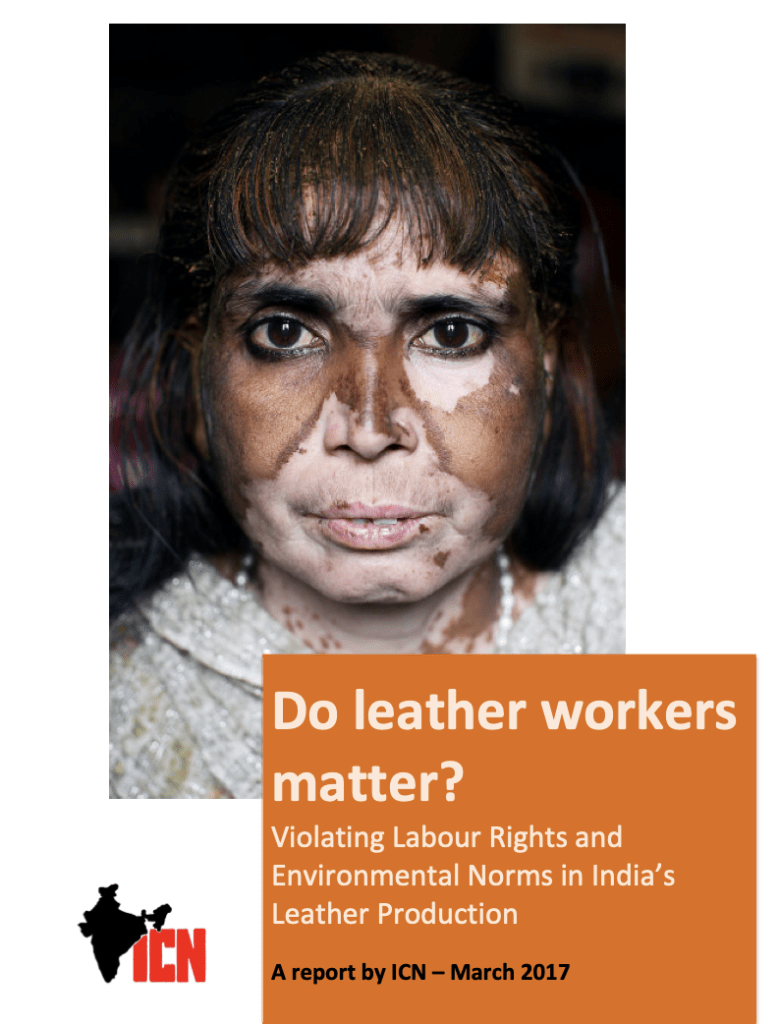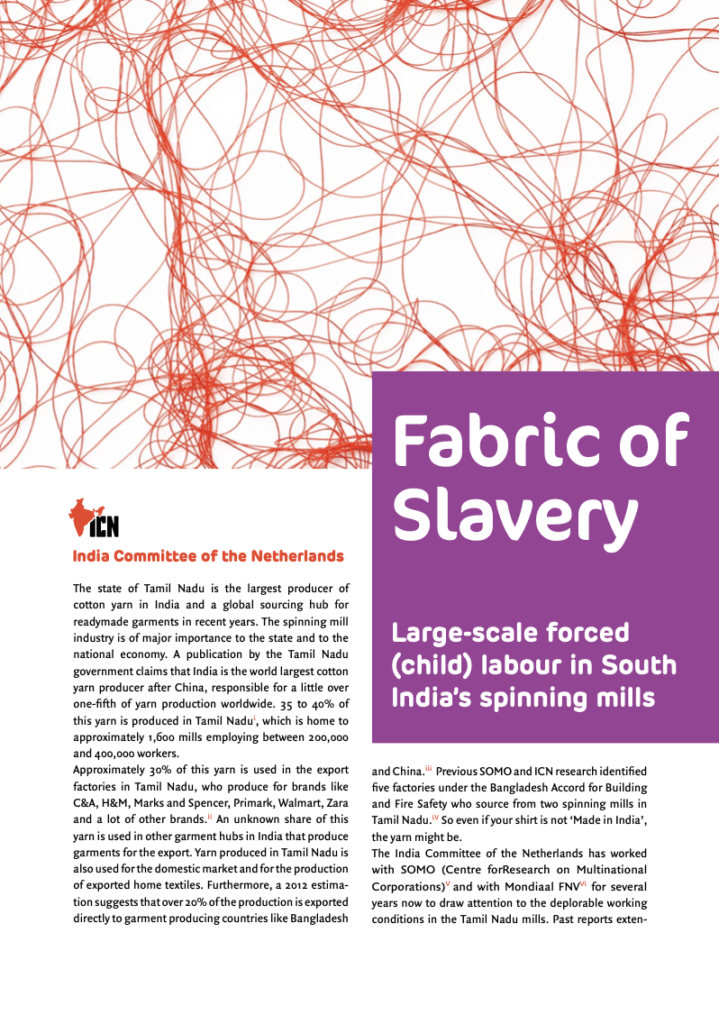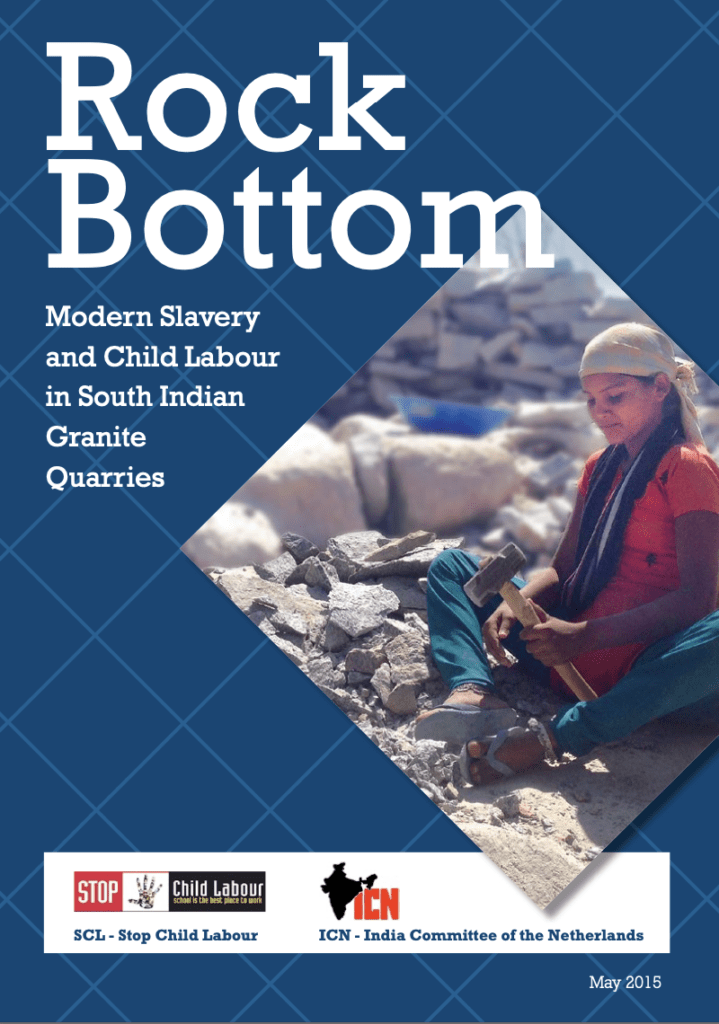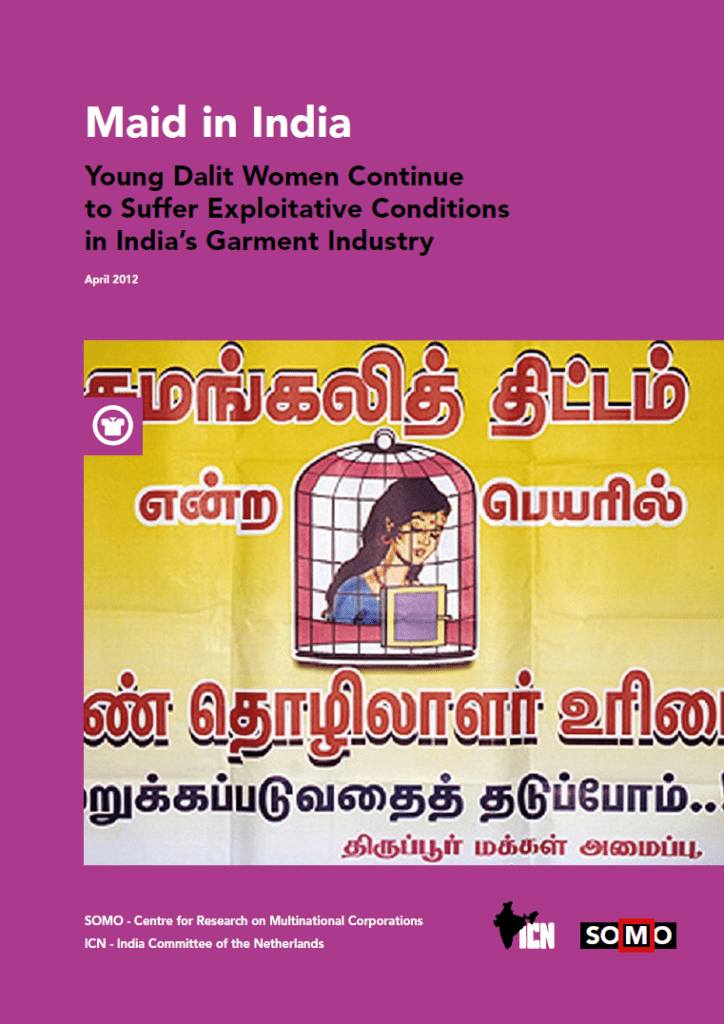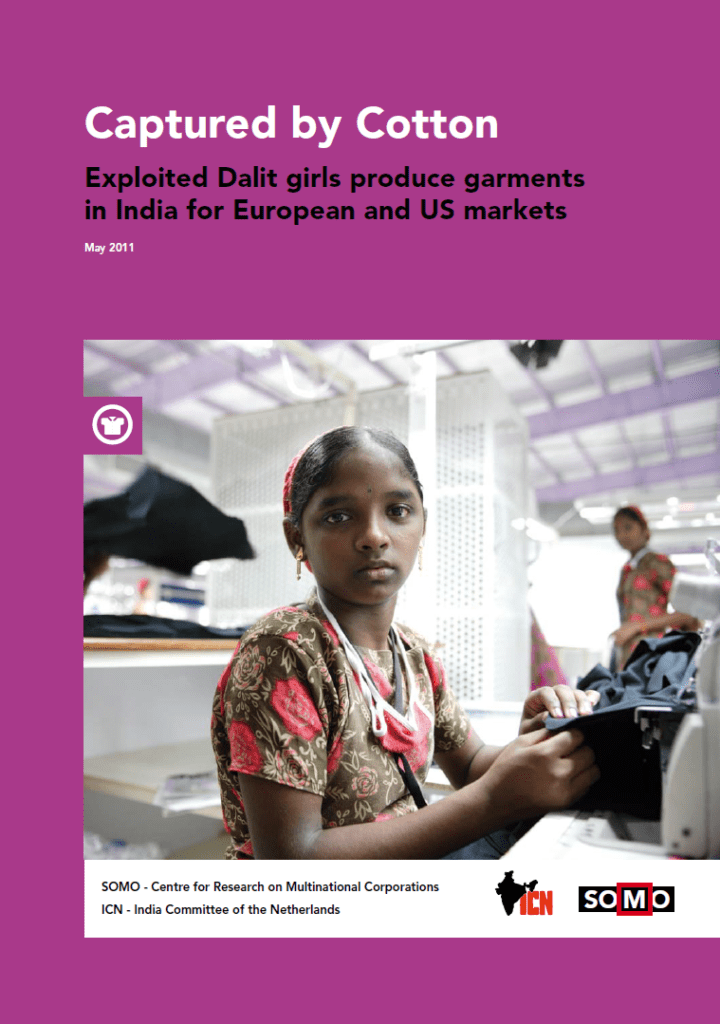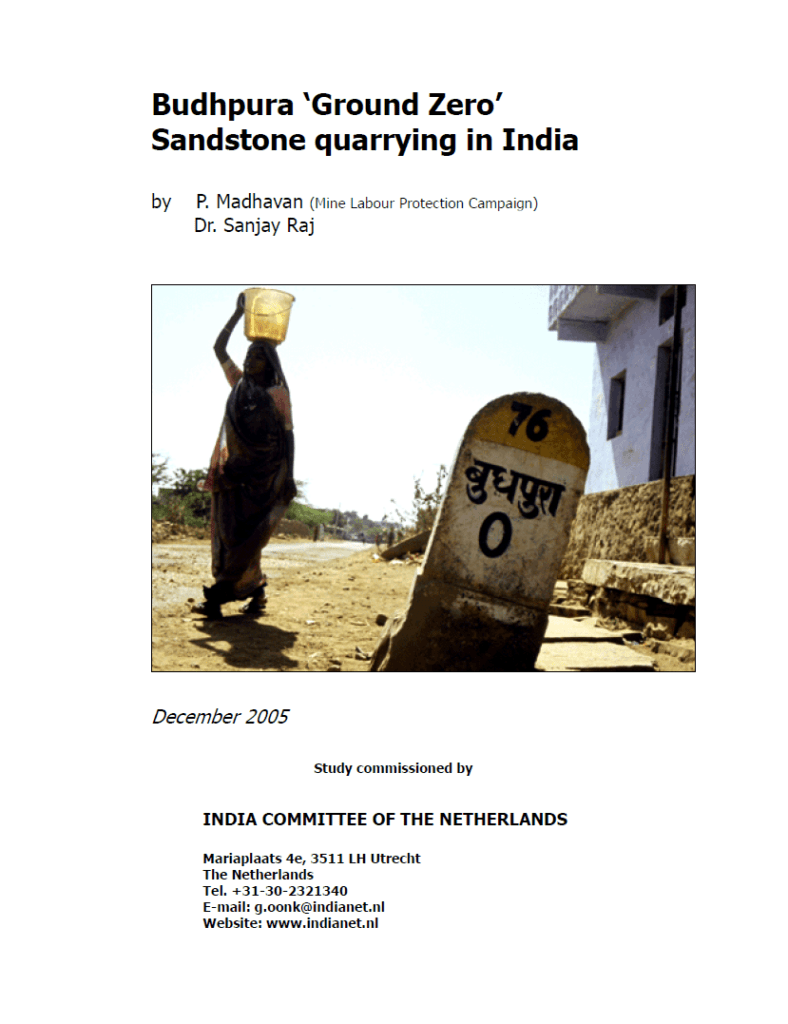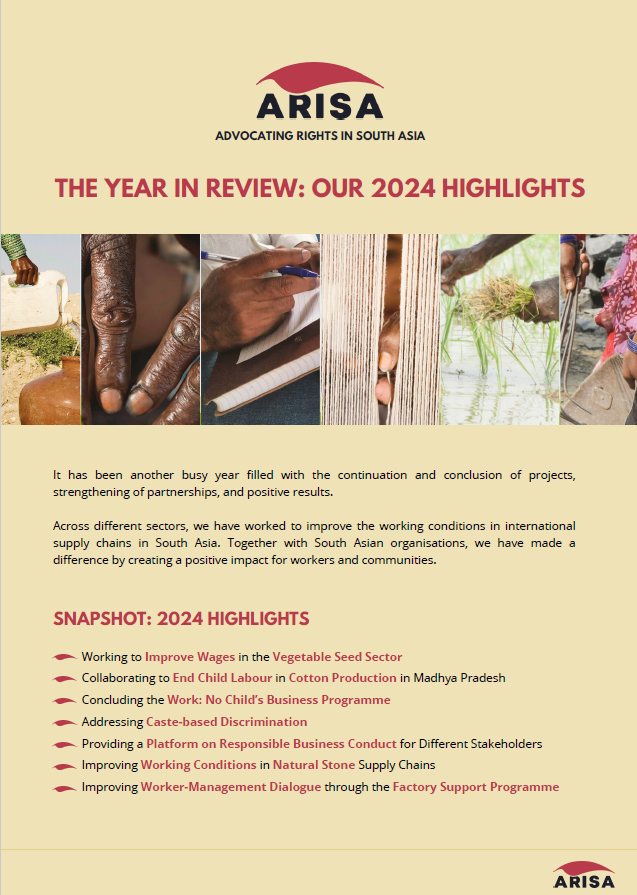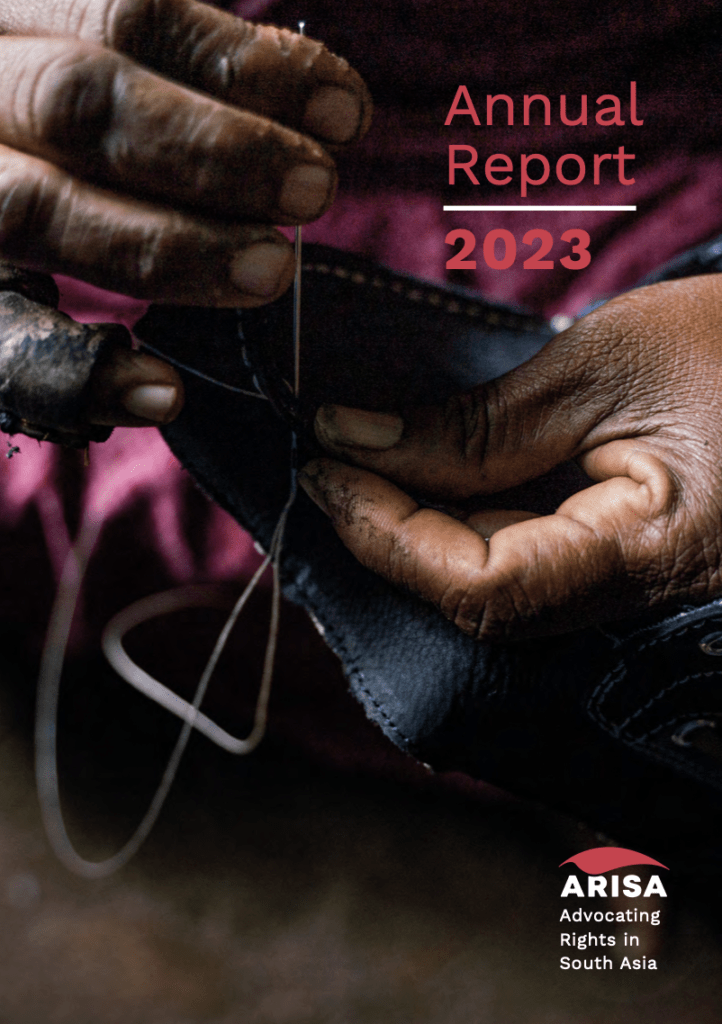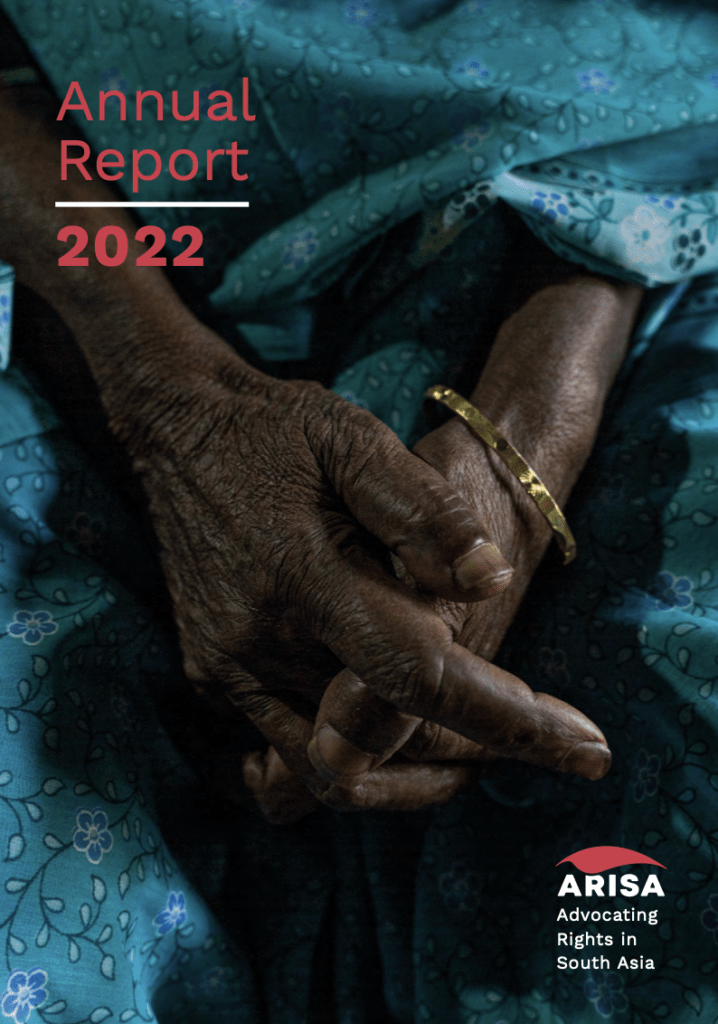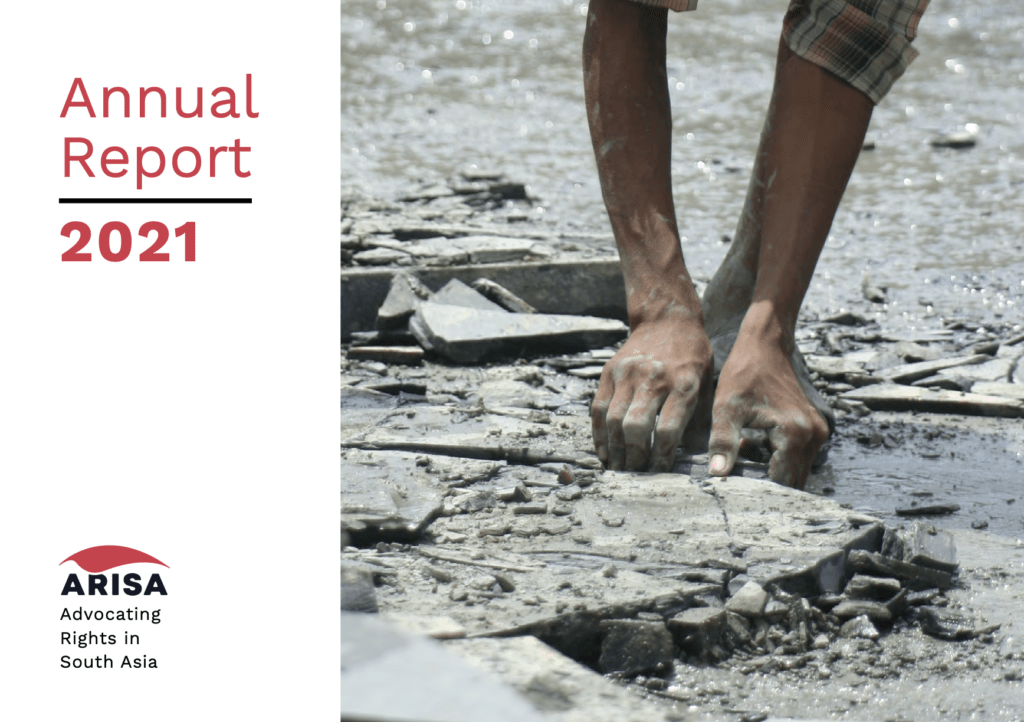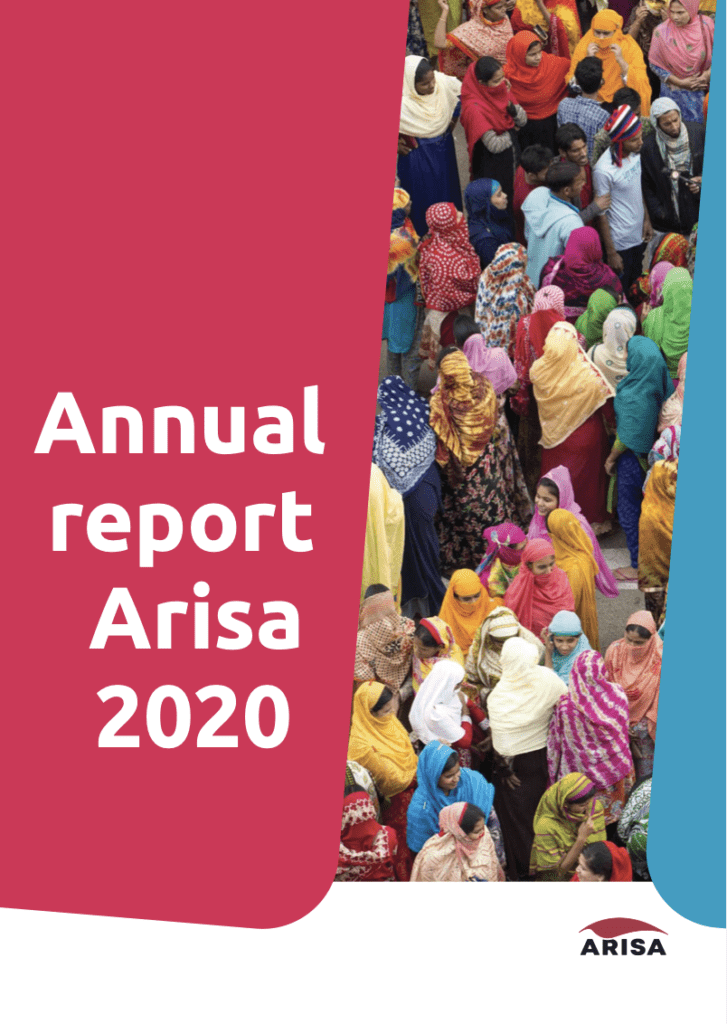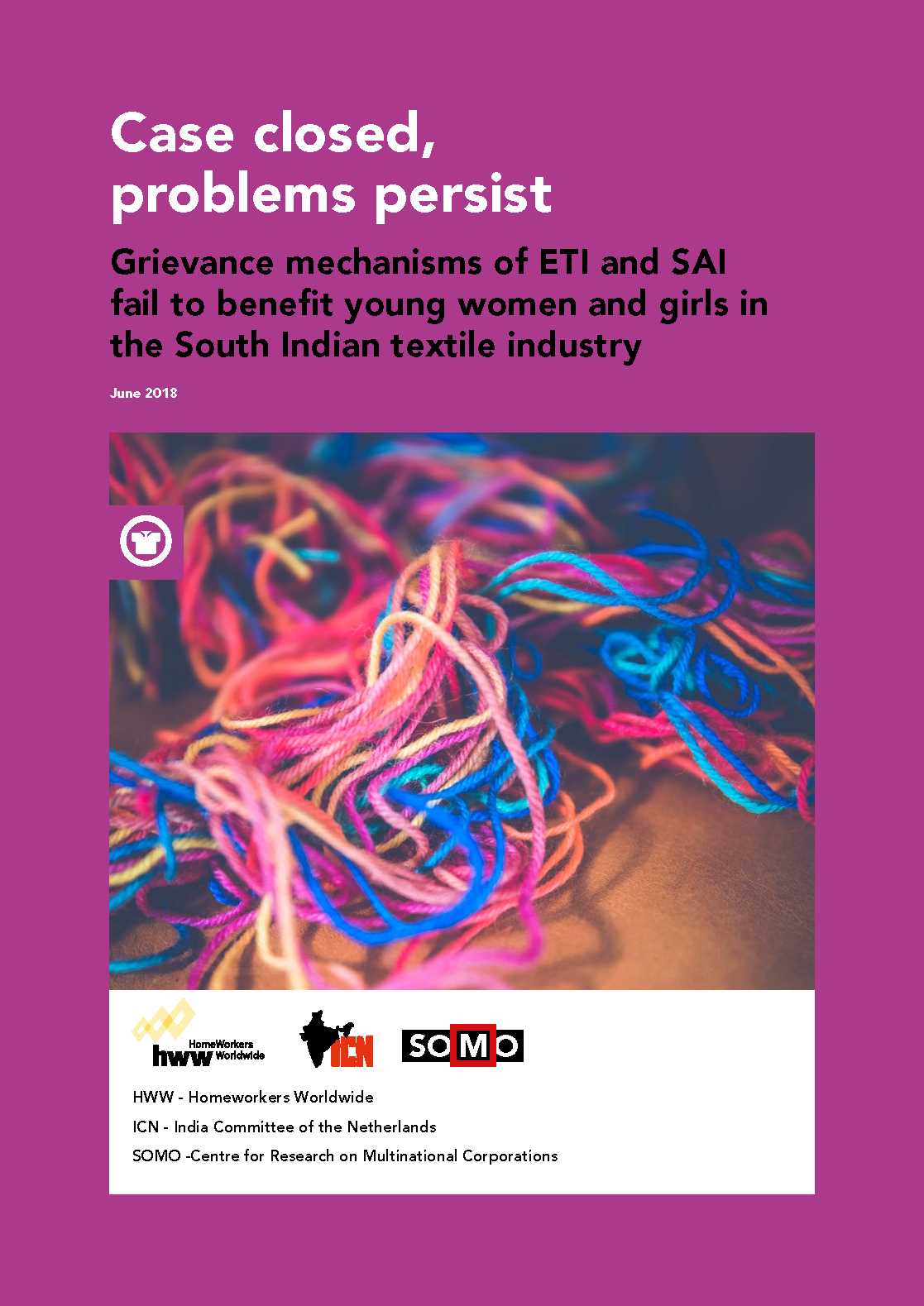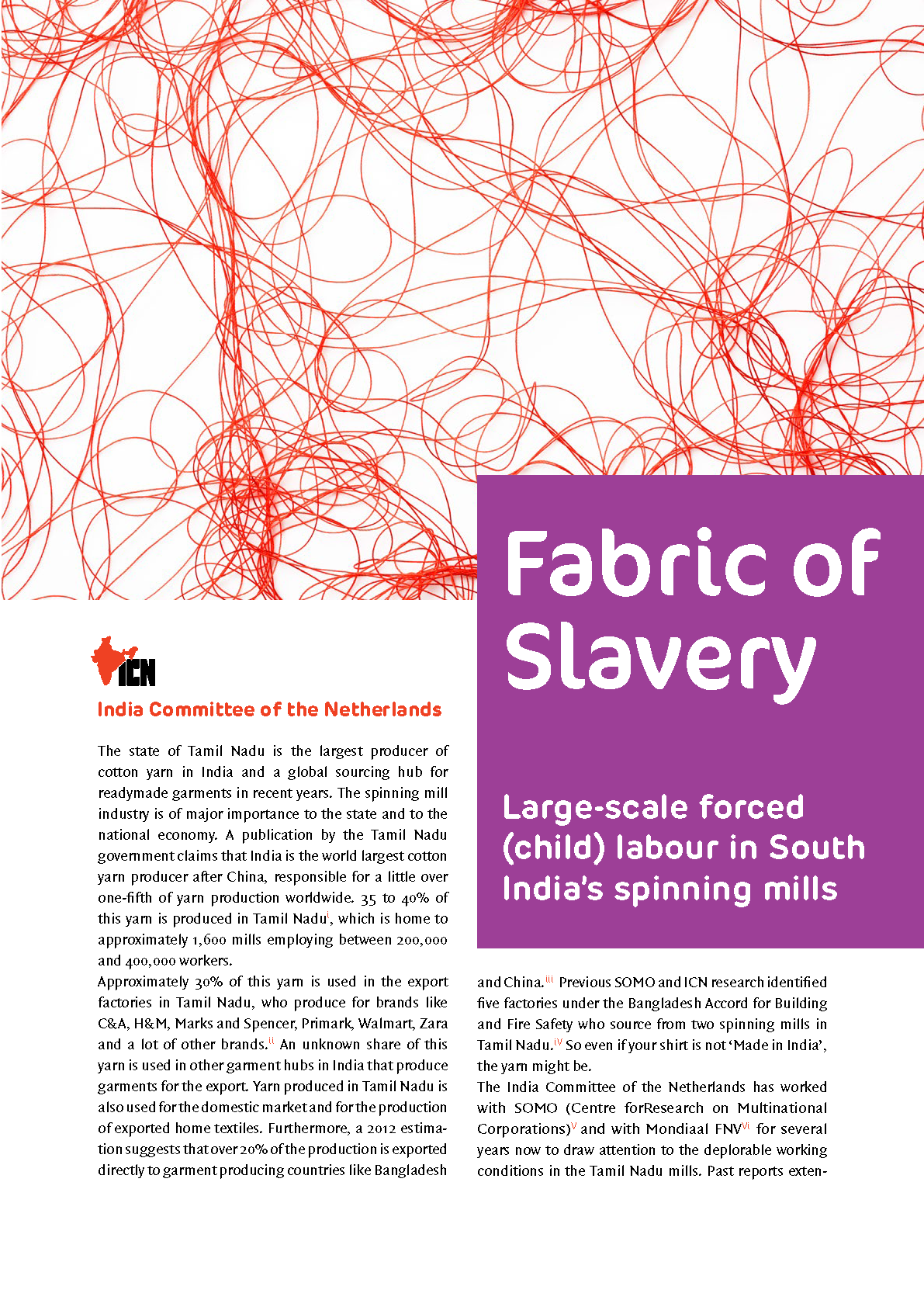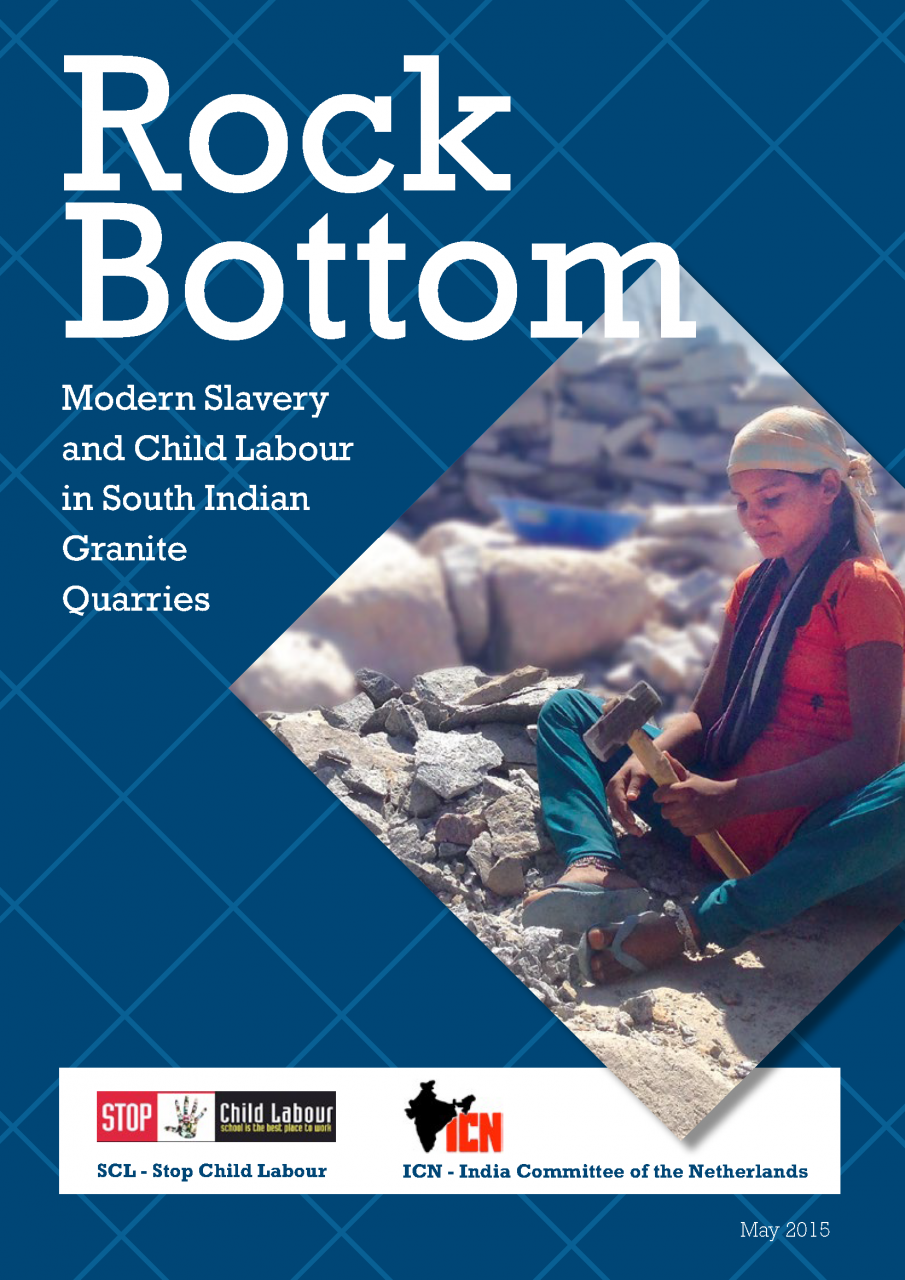Meest recente publicaties
Bekijk onze publicaties of lees hier meer over ons onderzoek.
Jaarverslagen
Januari 2026
Blind spots in textile recycling: Fashion’s sustainability claims overlook workers’ rights
Het gebruik van gerecycled textiel in kleding en textiel producten resulteert in minder vraag naar nieuwe grondstoffen en maakt dat een deel van de enorme textielafvalberg die de kleding industrie produceert wordt gebruikt als grondstof voor nieuwe producten. Aangezien dit leidt tot een iets minder grote ‘voetafdruk’ wordt het gebruik van gerecycled textiel gezien als duurzaam en verantwoord. Maar hoe zit het met de rechten van de werkers die dit textiel recyclen? Eerdere studies hebben uitgewezen dat veel werkers in de textiel recycling industrie in zuid Azië onder barre omstandigheden werken, met veel gezondheids- en veiligheidsrisico’s, lage lonen, en geen formeel contract en sociale zekerheid. In Arisa’s nieuwe publicatie Blind spots in textile recycling: Fashion’s sustainability claims overlook workers’ rights worden 20 fast fashion merken die gerecyclede textiel gebruiken in hun producten bevraagd over in hoeverre arbeidsomstandigheden van de textiel recycling werkers in hun keten worden meegenomen hun due diligence activiteiten.
Januari 2026
The human cost of textile recycling Case study Pakistan
Pakistan heeft een gevestigde textielrecycling industrie. Geïmporteerde gebruikte kleding vanuit de hele wereld wordt in het land gesorteerd waarna het deels weer wordt geëxporteerd, en deels op tweedehandsmarkten in Pakistan wordt verkocht. Daarnaast is er veel textielafval uit de binnenlandse kleding- en textielindustrie, wat in recycling units wordt verwerkt tot gerecyclede vezels. Een nieuwe publicatie van Arisa, The human cost of textile recycling: Case study Pakistan, geeft een inkijkje in de wereld van textiel recycling in Pakistan. Het laat de belangrijkste gebieden zien waar dit plaatsvindt, hoe de industrie is georganiseerd en geeft een stem aan degenen die er het dichtst bij staan: de werkers en eigenaren van de recycling units. Lees deze nieuwe publicatie om meer te weten te komen over de verborgen kanten van textiel recycling.
November 2025
The human cost of textile reycling
Case study India
India heeft een grote textielrecyclingindustrie, waar zowel industrieel textielafval als tweedehands kleding uit alle delen van de wereld wordt verwerkt tot gerecycled garen. In de nieuwe publicatie van Arisa, The human cost of textile recycling: Case study India, krijg je een inkijkje in de wereld van textielrecycling in India. Het laat zien hoe de industrie globaal is georganiseerd en onder welke omstandigheden het textielafval verwerkt wordt, en door wie. Lees nu onze nieuwe publicatie en kom meer te weten over de verborgen kanten van textielrecycling en waarom kleding met gerecycled materiaal niet automatisch een duurzame aankoop is.
اکتوبر 2025
حد سے زیادہ محنت اور نا کافی اجرت ۔ پاکستان کی گارمنٹ ایکسپورٹ فیکٹریوں میں اوقاتِ کار کی زیادتی، اجرتوں کی چوری اور
خراب حالاتِ کار
پاکستان کی ڈینم برآمدی فیکٹریوں میں کام کرنے والے مزدور طویل اوقاتِ کار، اجرتوں کی چوری اور غربت کی سطح کی اجرتوں کا شکار
ہیں۔ مزدوروں کے حقوق کی ان وسیع خلاف ورزیوں کی تفصیلات اس رپورٹ میں پیش کی گئی ہیں جو اریسا (Arisa) نے پاکستانی
محققین کے ساتھ مل کر تیار کی۔ یہ رپورٹ کراچی اور لاہور کی آٹھ گارمنٹس فیکٹریوں کے 126 مزدوروں کے انٹرویوز اور فوکس گروپ
مباحثوں پر مبنی ہے۔
زیادہ تر مزدوروں نے بتایا کہ وہ معمول کے مطابق قانونی حد سے زیادہ اوقات میں کام کرتے ہیں۔ اوور ٹائم لازمی اور اکثر بغیر اضافی
اجرت کے ہوتا ہے۔ اضافی گھنٹے کام کرنے سے انکار پر مزدوروں کو دھمکیوں، ہراسانی، اجرتوں میں کٹوتی یا برطرفی کا سامنا کرنا پڑتا
ہے۔ علاوہ ازیں، ان مزدوروں کو سماجی تحفظ کے فوائد تک بہت محدود یا بالکل بھی رسائی حاصل نہیں۔
تحقیق کی گئی فیکٹریاں پاکستان کی بڑی ٹیکسٹائل کمپنیوں کا حصہ ہیں جو برآمدات میں نمایاں کردار ادا کرتی ہیں۔ ان فیکٹریوں سے
کئی معروف بین الاقوامی برانڈز اپنے مصنوعات حاصل کرتے ہیں، جن میں شامل ہیں:
Bestseller، Boohoo، C&A، Gap، H&M، Inditex، Kontoor Brands، Levi Strauss، Mango، Next، اور Primark۔
Juli 2025
The Fast Fashion Waste Mountain
In Arisa’s nieuwe publicatie ‘The Fast Fashion Waste Mountain’ zetten we de belangrijkste feiten op een rij over wat er met je kleding gebeurt nadat je het wegdoet, zodat je de werkelijke impact van onze kleding leert kennen—van wat er mee gebeurt nadat we het weggooien, tot waar al dat textielafval uiteindelijk terechtkomt. Het laat zien op welke verschillende manieren onze afgedankte kleding in de EU wordt verzameld en verwerkt en hoe het de grenzen oversteekt, met gevolgen voor milieu en mens wereldwijd. Ontdek meer over de verborgen kosten van fast fashion en wat jij kan doen om het verhaal te veranderen!
Juli 2025
Overworked and Underpaid – Excessive hours, wage theft and poor working conditions in Pakistan’s garment export factories
Pakistaanse kledingwerkers worden structureel onderbetaald terwijl ze buitensporig veel uren maken. Dat blijkt uit dit onderzoek van Arisa in acht denimfabrieken die produceren voor grote internationale modemerken. Voor dit onderzoek spraken Arisa en Pakistaanse onderzoekers met 126 kledingwerkers in Karachi en Lahore. De meerderheid van de geïnterviewden gaf aan stelselmatig langer te moeten werken dan wettelijk is toegestaan. Overwerk is vaak verplicht en onbetaald. Wie overwerk weigert, loopt het risico op intimidatie, looninhouding of ontslag. Ook hebben ze nauwelijks toegang tot sociale voorzieningen.
De onderzochte fabrieken maken deel uit van toonaangevende textielgroepen die verantwoordelijk zijn voor een groot deel van de Pakistaanse kledingexport. Bekende internationale kledingmerken waaronder Bestseller, Boohoo, C&A, Gap, H&M, Inditex, Kontoor Brands, Levi Strauss, Mango, Next en Primark kopen kleding in bij deze fabrieken.
Februari 2025
A hidden workforce: Precarious contract labour in Tamil Nadu’s garment industry
Deze briefing onderzoekt de dynamiek van contractarbeid in de kledingsector in Tamil Nadu. Het onderzoekt de structuur, wetgeving, vormen, voordelen en nadelen van contractarbeid voor zowel werkenden als werkgevers. Daarnaast worden de kansen en risico’s gerelateerd aan contractarbeid besproken. Internationale kledingmerken, retailers, distributiegroepen en inkoopcentrales moeten hier rekening mee houden in hun zakelijke relaties met leveranciers om een verantwoorde bedrijfsvoering te garanderen.
Januari 2025
Precarious labour and silenced workers – The position of workers from Scheduled Caste communities in the textiles and garment industry in Pakistan
Arisa, The Knowledge Forum en Pakistan Dalit Solidarity Network beschrijven in dit rapport de situatie van werknemers uit kwetsbare kastengroepen in de Pakistaanse exportgerichte kledingindustrie.
November 2024
Caste in stone
Employment and working conditions in the Rajasthan sandstone and marble supply chains – a caste perspective
Wereldwijd kunnen bedrijfsactiviteiten aanzienlijke risico’s met zich meebrengen voor werknemers, hun gemeenschappen en het milieu. In industrieën zoals de winning van natuursteen, waarin exploitatie van arbeidskrachten veel voorkomt, worden gemarginaliseerde gemeenschappen het hardst getroffen. Dit rapport van Arisa en het Centre for Labour Research and Action (CLRA) werpt licht op de ervaringen van gemarginaliseerde kaste-gemeenschappen in Rajasthan, India, waar werkers vast zitten in gevaarlijke, laagbetaalde en informele banen.
Discriminatie en uitsluiting op basis van kaste zijn vaak fundamentele oorzaken van wijdverspreide schendingen van arbeidsrechten. Bedrijven die actief zijn in gebieden waar kasten bestaan of daar materialen inkopen, moeten zich bewust zijn van deze risico’s en stappen ondernemen om ze aan te pakken. Als bedrijven dit niet doen, kan dit de effectiviteit van hun due diligence inspanningen ondermijnen.
September 2024
Trends in Production and Trade – Cotton, Textiles and Garments from Pakistan
De internationale kledingproductie in Zuid-Azië is heel belangrijk voor de internationale markt. Na Bangladesh en India is Pakistan de derde grootste exporteur van katoen, textiel en kleding in de regio, en de achtste grootste in Azië. Door de unieke geografie, het klimaat en de demografie heeft Pakistan een grotendeels verticaal geïntegreerde toeleveringsketen, waarin productieactiviteiten, variërend van katoenteelt tot garenspinnen, textielproductie, naaien en recycling, in eigen land plaatsvinden.
Nu de kwakkelende Pakistaanse economie te kampen heeft met een groot aantal crises, waaronder inflatie, politieke onrust en milieurampen, zal de export van katoen, textiel en kleding in de nabije toekomst onmisbaar blijven voor de welvaart van het land. Dit rapport geeft een overzicht van recente trends in exportbestemmingen en prominente productcategorieën, en brengt de belangrijkste Pakistaanse productiebedrijven en buitenlandse afnemers in kaart. Als zodanig geeft het een overzicht van de recente ontwikkelingen in de Pakistaanse katoen-, textiel- en kledingindustrie.
Kleding en textiel
Juni 2023
RVO-WISH Project
(Wage Improvements in Seeds Hybrids) – Child Labour and minimum wages baseline and risk assessment study
Kinderarbeid en het niet betalen van minimumlonen bij de productie van hybride groentezaden in India heeft de afgelopen jaren veel aandacht gekregen. Verschillende industrie rapporten van Fair Labor Association (FLA) en Arisa geven aan dat de zaadproductie sector in India te maken heeft met verschillende kritieke en systemische problemen op het gebied van mensenrechten en arbeidsrechten.
In 2021 hebben BASF, Syngenta en Arisa de handen ineengeslagen in een multistakeholder-samenwerking genaamd Wage Improvements in Seed Hybrids (WISH), om te streven naar naleving van het minimumloon en kinderarbeid aan te pakken in de groentezaadsector in India.
Het vierjarige WISH project bestaat uit twee fasen: In de eerste fase deed WISH een
nulonderzoek om de huidige status van kinderarbeid en minimumloon in kaart te brengen in de zaadproductielocaties waar BASF en Syngenta actief zijn, en om indicatoren te ontwikkelen om de toekomstige projectresultaten te meten.
Dit rapport is het resultaat van de eerste fase. De gegevens uit het veld en de productiekosten gegevens zijn verzameld en geanalyseerd door Glocal Research en MV Foundation, twee in India gevestigde organisaties, met steun van Arisa. Het onderzoek beperkt zich niet tot de boerderijen van Syngenta en BASF, maar omvat informatie van verschillende bedrijven die actief zijn op de onderzoekslocaties.
Groentezaden
Kinderarbeid
Minimum loon
Maart 2023
Hides & Hardship – Caste-based discrimination in the leather industry in India, Bangladesh and Pakistan
Hides & Hardship toont aan dat kaste en aanverwante discriminerende praktijken, soms specifiek gekoppeld aan religie, hoge risicofactoren zijn voor bedrijven die leer of leerproducten uit India, Bangladesh of Pakistan betrekken. Er wordt uitgelegd hoe discriminatie op basis van kaste en religie zich in deze landen manifesteert en hoe dit verband houdt met de leerindustrie.
Werken met leer wordt in India, Bangladesh en Pakistan gezien als vuil en ongepast. Veel van de mensen die in de industrie werken – het overgrote deel – hebben een gemarginaliseerde positie in de samenleving en hebben vaak geen andere mogelijkheden om in hun levensonderhoud te voorzien. Zij zijn kwetsbaar voor uitbuiting en hebben weinig of geen mogelijkheden om vooruit te komen in werk of het leven en om zo de cyclus van armoede en discriminatie voor henzelf of hun kinderen te doorbreken.
Er is een concreet verband tussen kaste en de leerindustrie, en er is ook een religieus verband aanwezig, vooral in India. Aangezien religieuze minderheden in deze drie landen voor veel uitdagingen staan, kunnen de onderlinge verbanden tussen kaste, religie en leerwerk niet worden genegeerd wanneer we kijken naar discriminerende praktijken in de industrie in deze landen.
Discriminatie (gender, kaste, religie)
Leer
Maart 2023
Labour abuses in supply chains uncovered – Leather and leather shoes from India
De leer- en lederwarenindustrie in India levert een aanzienlijke bijdrage aan de wereldwijde vraag naar leer en lederen goederen. Het draagt ook een behoorlijke hoeveelheid bij aan het bruto binnenlands product (bbp) van het land. In 2019 bedroeg de Indiase lederuitvoer in totaal ongeveer 5,5 miljard USD en hielp hij bijna 4,42 miljoen officiële of ”formele’ werknemers aan werk. Alle stadia van de leerproductie vinden plaats in India – van grotere exportlooierijen en fabrieken die lederwaren produceren tot kleinere werkplaatsen en thuiswerkers die met de hand leren bovendelen voor schoenen stikken. De sector wordt vaak
geassocieerd met slechte arbeidsomstandigheden, zoals lage lonen, lange werktijden, gezondheids- en veiligheidsproblemen, informele arbeidsverhoudingen en problemen met de vrijheid van vereniging.
Voor het Together for Decent Leather programma werd nieuwe informatie verzameld over de arbeidsomstandigheden in deze sector in India, Bangladesh en Pakistan. In elk van deze landen werden drie veldstudies uitgevoerd. In deze briefing paper geven we een overzicht van de belangrijkste bevindingen van de studie over de arbeidsomstandigheden van leerarbeiders in de deelstaat Tamil Nadu in India. Deze briefing paper richt de schijnwerper op de leercluster in Tamil Nadu, en hoe deze cluster zich verhoudt tot de Indiase leerindustrie en exportmarkt. Een belangrijk aspect van dit paper is het verband dat wordt gelegd met internationale bedrijven die verbonden zijn met de leerindustrie in Tamil Nadu – en die dus potentiële risico’s lopen in hun productieketens. Dit rapport is gebaseerd op het volledige veldonderzoeksrapport (dat hier te vinden is).
juli 2021
Seeds of Oppression
Het rapport “Seeds of Oppression”, uitgebracht door Arisa en CLRA, belicht een slavernij-achtige realiteit voor veel werkers in Gujarat – veelal migranten uit andere gebieden – die in de katoenzaadsector werken. De misstanden beschreven in dit rapport zoals gedwongen arbeid, seksuele uitbuiting, structurele onderbetaling en erbarmelijke werkomstandigheden zijn anno 2021 nog aan de orde van de dag. Als deze arbeiders hun werkgevers bevragen over feiten, gaan al gauw verhalen rond dat zij ongehoorzaam zijn en dit verkleint hun kans op toekomstig werk.
mei 2021
Spinning around workers’ rights – International garment companies linked to forced labour in Tamil Nadu textile mills
Gedwongen arbeid is een groot risico in Indiase spinnerijen die garens en stoffen produceren voor de internationale kleding- en textielindustrie. Dit blijkt uit grootschalig onderzoek van SOMO en Arisa bij 29 spinnerijen in de Indiase deelstaat Tamil Nadu. De al zeer kwetsbare arbeiders worden nu bovendien keihard geraakt door de voortdurende coronacrisis in India.
Discriminatie (gender, kaste)
Gedwongen arbeid
Kinderarbeid
Kleding en textiel
mei 2021
Leather products from India – Trends in production and trade
Arisa neemt deel aan het programma “Together for Decent Leather”, een driejarig programma dat zich richt op het verbeteren van de arbeidsomstandigheden van leerarbeiders in India, Pakistan en Bangladesh. Als onderdeel van dit programma worden overzichten gemaakt van trends in de productie en handel van leer en leerproducten, één voor elk van de productielanden. Arisa publiceerde op 18 mei het landenoverzicht voor India, waarin informatie te vinden is over de productie van leer en leerproducten in India, waar deze naartoe worden verscheept en welke bedrijven ze inkopen. Download het overzicht hieronder.
juni 2020
Textile Recycling Unravelled
In een tijd waarin het hergebruik van materialen en het streven naar een circulaire economie hoog op de agenda staan, publiceren textielinzamelaar en sociaal ondernemer Sympany en NGO Arisa het rapport “Textile recycling unravelled”. Het rapport laat zien dat de keten van textielrecycling complex is en gepaard gaat met risico’s op kinderarbeid en slechte arbeidsomstandigheden. Het richt zich op de stad Panipat in India, waar een groot deel van de economie draait om het recyclen van geïmporteerd gebruikt textiel, onder andere vanuit Nederland. Sympany en Arisa roepen betrokken bedrijven in deze keten op om hun verantwoordelijkheid te nemen en de risico’s in de textielrecyclingsketen aan te pakken.
juni 2020
Between a Rock and a Hard Place
Zandsteen wordt in Europa veel gebruikt als kasseien of kinderkopjes. Dit rapport, “Between a rock and a hard place”, laat zien dat er vooruitgang is geboekt ten opzichte van het rapport hierover van Arisa uit 2005. Kinderarbeid is sterk verminderd in de groeves maar het komt nog wel voor, met name bij het hakken van kasseien dat door thuiswerkers wordt gedaan. Naast kinderarbeid is in het onderzoek ook gekeken naar het betalen van minimumlonen. Hier is de situatie een stuk minder positief. Vooral vrouwen worden gediscrimineerd omdat zij andere werkzaamheden krijgen – waarvoor minder wordt betaald – dan mannen. Verder laat het rapport zien dat silicose, een ongeneeslijke stoflongziekte, een groot probleem is waar nog te weinig aandacht voor is.
juni 2020
Sowing Hope
Nieuw rapport van Arisa, met een hoopgevende boodschap. Het rapport “Sowing Hope” laat zien dat in de katoen- en groentezaadproductie in India de afgelopen vijf jaar belangrijke stappen zijn gezet om kinderarbeid tegen te gaan. Met name in de gebieden waar aanzienlijke interventies plaatsvonden, nam kinderarbeid af.
Naast kinderarbeid is in het onderzoek ook gekeken naar het betalen van minimumlonen. Hier is de situatie een stuk minder positief. In de afgelopen vijf jaar is het gat tussen betaald loon en minimumloon groter geworden. Vooral vrouwen worden onder het minimumloon betaald en worden daarnaast gediscrimineerd omdat zij andere werkzaamheden krijgen – waarvoor minder wordt betaald – dan mannen.
Groentezaden
Kinderarbeid
Kleding en textiel (katoenzaden)
Minimumloon
november 2018
Remedies for Indian seed workers in sight?
Dit rapport van de Landelijke India Werkgroep (LIW) laat zien dat zaadbedrijven, ondanks vooruitgang bij de bestrijding van kinderarbeid, het probleem nog niet voldoende hebben aangepakt. Daarnaast hebben de bedrijven onvoldoende maatregelen genomen om minimumlonen te garanderen, met name de lonen van vrouwen blijven achter.
Groentezaden
Kinderarbeid
Kleding en textiel (katoenzaden)
Minimumloon
juni 2018
Case closed, problems persist
Social Accountability International (SAI), een organisatie voor sociale certificering voor fabrieken en organisaties, en het Ethical Trading Initiative (ETI), een alliantie van bedrijven, vakbonden en vrijwilligersorganisaties die werken aan het verbeteren van het leven van werknemers, hebben hun belofte om de concrete klachten over zeer slechte arbeidsomstandigheden van meisjes en jonge vrouwen in de textiel- en kledingindustrie in Zuid-India effectief aan te pakken, niet kunnen nakomen.
Dit is het resultaat van een analyse van de non-juridische klachtenmechanismen van ETI en SAI gepresenteerd in dit rapport van LIW, SOMO en het in het Verenigd Koninkrijk gevestigde HomeWorkers Worldwide (HWW).
Discriminatie (kaste, gender)
Gedwongen arbeid
Kinderarbeid
Kleding en textiel
januari 2018
Labour without liberty
Vrouwelijke migranten die werken in India’s kledingfabrieken die leveren aan grote internationale merken zoals Benetton, C&A, GAP, H&M, M&S en PVH, zijn het slachtoffer van moderne vormen van slavernij. In Bangalore, India’s grootste kleding producerende regio, worden jonge vrouwen geronseld met valse beloftes over lonen en andere vergoedingen. Ze werken in kledingfabrieken onder hoge druk voor lage lonen. Hun leefomstandigheden in hostels zijn slecht en hun bewegingsvrijheid is ernstig beperkt. Hoewel ze beweren achttien te zijn, zien veel werknemers er veel jonger uit.
Dit zijn enkele conclusies uit dit rapport van LIW, SKC en GLU.
augustus 2017
The dark sites of granite
Nieuw onderzoek, in opdracht van de Landelijke India Werkgroep en Stop Kinderarbeid, toont aan dat moderne slavernij, lage lonen, gevaarlijke en ongezonde werkomstandigheden veelvuldig voorkomen in Zuid-Indiase granietgroeves. In een aantal groeves is ook kinderarbeid aangetroffen.
Er is een groot verschil in arbeidsomstandigheden tussen vaste werknemers (met name opzichters) en tijdelijke arbeidskrachten (70% van de arbeiders). De eerste groep krijgt een veiligheidsuitrusting, een zorgververzekering en een arbeidscontract, terwijl de tijdelijke arbeidskrachten, die zware handarbeid verrichten, deze fundamentele arbeidsrechten moeten ontberen.
maart 2017
Do leather workers matter?
Ongeveer 2,5 miljoen werknemers in de Indiase leerindustrie werken onder vaak onaanvaardbare arbeidsomstandigheden. Hun mensenrechten worden geschonden en hun werk heeft ernstige gevolgen voor hun gezondheid. Zo hebben giftige chemicaliën in leerlooierijen vaak een zeer negatieve invloed op de gezondheid van de werknemers. Minder bekend zijn de vele arbeids- en andere mensenrechtenkwesties in de leerindustrie, zoals lonen onder het vastgestelde minimum, kinderarbeid, uitbuiting van thuiswerkers, problemen bij het zich organiseren in vakbonden en de discriminatie van Dalits (‘kastelozen’).
Dit is in het kort de positie van leerbewerkers die gedetailleerd wordt beschreven in dit LIW-rapport.
Discriminatie (gender, kaste, religie)
Kinderarbeid
Leer
december 2016
Fabric of Slavery
Onderzoek toont aan dat verschillende vormen van moderne slavernij, waaronder ook kinderslavernij, voorkomen in meer dan 90% van de spinnerijen in Zuid-India. Zuid-Indiase spinnerijen leveren garen voor Indiase, Bengalese en Chinese kledingfabrieken die produceren voor de Westerse markt.
Het rapport Fabric of Slavery onthult de schaal waarop jonge meisjes en vrouwen onderworpen zijn aan werkgevers die hun loon inhouden of hen opsluiten in door het bedrijf gecontroleerde hostels. Ze maken lange werkdagen, zijn slachtoffer van seksuele intimidatie en verdienen zelfs niet het minimumloon.
Discriminatie (gender, kaste)
Gedwongen arbeid
Kinderarbeid
Kleding en textiel (spinnerijen)
mei 2015
Rock Bottom
In Indiase steengroeves is massaal sprake van moderne slavernij. Ook kinderarbeid komt regelmatig voor. De meeste Nederlandse importeurs van Indiaas graniet geven niet aan uit welke groeves hun graniet komt of zeggen dat niet te weten. Dat blijkt uit het rapport Rock Bottom – Modern Slavery and Child Labour in South Indian Granite Quarries van de Landelijke India Werkgroep in samenwerking met de coalitie Stop Kinderarbeid naar de arbeidsomstandigheden bij de granietwinning in het zuiden van India.
april 2012
Maid in India
In dit rapport presenteren we onze bevindingen over de arbeidsomstandigheden in de Zuid-Indiase kleding- en textielindustrie. In Tamil Nadu hebben jonge vrouwelijke arbeiders nog steeds te lijden onder uitbuitende arbeidsomstandigheden tijdens het maken van kleding voor westerse merken. Duizenden meisjes werken onder wervings- en tewerkstellingsprogramma’s die neerkomen op schuldarbeid.
Maid in India’ bevat casestudy’s van vier grote kledingfabrikanten in Tamil Nadu die voor de Europese en Amerikaanse markt produceren. De meerderheid van de arbeiders zijn Dalit-meisjes jonger dan 18 jaar uit arme gezinnen die worden gelokt met beloften van een fatsoenlijk loon, comfortabele accommodatie en, in sommige gevallen, een geldbedrag na afloop van het contract dat kan worden gebruikt voor hun bruidsschat. Een groot aantal van deze arbeidsmigranten woont in (fabrieks)hostels waar ze weinig tot geen contact hebben met de buitenwereld, laat staan met vakbonden of vakbondsvertegenwoordigers. Van arbeiders wordt verwacht dat ze lange uren gedwongen overwerken onder ongezonde omstandigheden. Vakbonden zijn zwak en worden geconfronteerd met enorme tegenwerking.
Dit rapport is bedoeld om relevante belanghebbenden – fabrikanten, merken, initiatieven van meerdere belanghebbenden, overheden en anderen – van input te voorzien om verdere actie mogelijk te maken en te motiveren.
mei 2011
Captured by Cotton
Dit rapport belicht verschillende schendingen van arbeidsrechten waarmee meisjes en jonge vrouwen die onder het Sumangali Scheme werken in de kledingindustrie in Tamil Nadu geconfronteerd worden. Het Sumangali Scheme staat gelijk aan gebonden arbeid, op basis van het feit dat werkgevers eenzijdig een deel van het loon van de arbeiders inhouden totdat ze drie of meer jaar hebben gewerkt. Bovendien worden werknemers ernstig beperkt in hun bewegingsvrijheid en privacy. Werknemers werken in onveilige en ongezonde omstandigheden. Lokale en internationale NGO’s hebben uitgebreid verslag gedaan van het Sumangali Scheme.
Het is onvermijdelijk dat merken en winkelketens die inkopen in Tamil Nadu Sumangali-arbeiders in hun toeleveringsketen hebben. Arisa en SOMO keuren het Sumangali Scheme af als volstrekt onacceptabel en zijn van mening dat toeleveranciers een verantwoordelijkheid hebben om ervoor te zorgen dat de rechten van arbeiders in hun hele toeleveringsketen worden gerespecteerd.
december 2005
